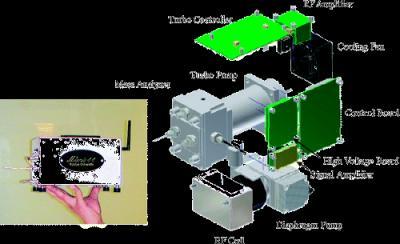R. Graham Cooks, Zheng Ouyang, and colleagues note that scientists have developed several different versions of portable mass spectrometers over the past few decades but those instruments' large size, weight, and inability to analyze a wide variety of different target molecules have limited their practical use.
The Indiana team responded to the need for a small but sensitive mass spectrometer by developing the Mini 11. About the size of a small shoebox, it weighs only 9 pounds (half the weight of other portable mass spectrometers), and can be operated by remote control.
Laboratory tests showed that the Mini 11 could accurately identify the chemical composition of three commonly used commercial drugs within just one minute using tandem mass spectrometry. Unlike previous portable mass specs, this new instrument is capable of analyzing a wider variety of molecules, including large proteins, the scientists say.

Chemists have developed the world's smallest mass spectrometer, the Mini 11, which could be used to detect hidden explosives or bioterrorism agents. Photo Credit: American Chemical Society.




Comments